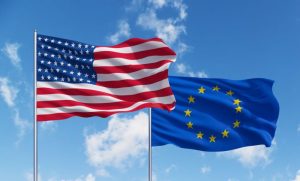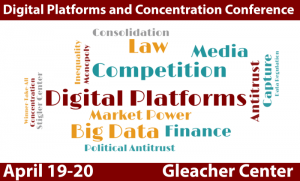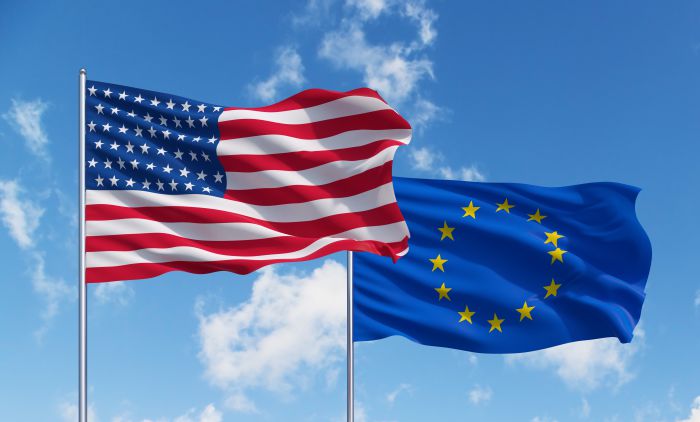What accounts for the difference in contemporary EU and US antitrust doctrine? Examined closely, says William E. Kovacic in Chapter 4 of our forthcoming Digital Platforms and Concentration ebook, the DNA of modern US antitrust doctrine is a double helix, with one strand coming from the Chicago School and a second strand from the modern Harvard school.
Editors’ note: See also our 2017 conference volume Is There a Concentration Problem in America? Other chapters from this year’s ebook can be read at the following links:
For the public enforcement of antitrust law against dominant firm misconduct, Brussels is the capital of the world. The US federal antitrust agencies, the Department of Justice (DOJ) Antitrust Division and the Federal Trade Commission (FTC) once ruled this domain. In the past 15 years, the European Commission (EC) and its Competition Directorate (DG Comp) have put the DOJ and FTC in the shade.
Recent antitrust scrutiny of Google by DG Comp and the FTC underscores the European Union’s ascent to preeminence. Earlier in this decade, the FTC took no action following an intensive investigation of Google for illegal monopolization. The FTC had assembled a dream team to help develop a case—notable additions included Ed Felton and Tim Wu. The agency’s five-member board contained three Democrats (Chairman Jon Leibowitz and Commissioners Julie Brill and Edith Ramirez) who had pledged to press for a more activist application of the Commission’s powers. If there was to be a moment ripe for the agency to bring a big case, this was it. Instead, the FTC stood down.
 The EU also has devoted great attention to complaints of improper exclusion by Google, with much different results. In 2017, the EC fined Google billions in an abuse of dominance case involving essentially the same issues and facts considered in the FTC inquiry. Today the Commission seems poised to announce still larger sanctions in a second, related matter.
The EU also has devoted great attention to complaints of improper exclusion by Google, with much different results. In 2017, the EC fined Google billions in an abuse of dominance case involving essentially the same issues and facts considered in the FTC inquiry. Today the Commission seems poised to announce still larger sanctions in a second, related matter.
Why have the EU and US antitrust agencies reached divergent outcomes in investigating claims of improper exclusion by Google? This discussion focuses chiefly on constraints that make the US system less inclined to intervene against dominant firms. In doing so, I depart from the conventional explanation, featured in many modern critiques of US antitrust policy, for why the US enforcement agencies have brought relatively few cases against dominant firms.
Demands for More Aggressive US Enforcement Involving Dominant Firms
Modern critiques about the weakness of US policy toward dominant firms blame subdued enforcement on acceptance of non-intervention perspectives generated by the Chicago School from the 1950s into the early 1980s. The culprits are academics such as Aaron Director, Robert Bork, Frank Easterbrook, and Richard Posner, whose views imbued the federal enforcement agencies with excessive caution about challenging dominant firm conduct. From this perspective, the Obama era certifies the paralyzing grip of non-intervention biases on DOJ and the FTC. Obama’s leadership team had control of the two federal agencies for eight years, but the single-firm conduct agenda proved to be thin. DOJ accepted settlements in a few interesting but lesser order cases. The FTC obtained settlements with Intel and a few other defendants, and the agency gained its first victory before the court of appeals in a monopolization case (McWane) since the late 1960s. Yet, in its Google inquiry, the matter the agency’s leadership depicted as its signature piece, the FTC closed the file upon receiving a letter from Google that made commitments (not embodied in an enforceable order) to make some adjustments in its practices.
 Critics have given a range of explanations for the FTC’s retreat in Google and, more generally, the Obama administration’s limited enforcement against single-firm misconduct. One theme, noted above, is that even the seemingly pro-enforcement officials and their advisors have been bitten by Chicago School mosquitos so often that they do not realize they have a low-grade form of non-intervention malaria. As a consequence, the enforcement agencies have fallen back on a cramped interpretation of their mandate that focuses myopically on consumer interests to the exclusion of other important values. A less charitable view is that the agencies simply lacked the courage to take tough but necessary cases to court. When the time came to take the big shot against Google, the story goes, the FTC simply choked. A still harsher assessment is that Google and other information technology companies pressured or beguiled Congress and the executive branch to back the enforcement agencies off.
Critics have given a range of explanations for the FTC’s retreat in Google and, more generally, the Obama administration’s limited enforcement against single-firm misconduct. One theme, noted above, is that even the seemingly pro-enforcement officials and their advisors have been bitten by Chicago School mosquitos so often that they do not realize they have a low-grade form of non-intervention malaria. As a consequence, the enforcement agencies have fallen back on a cramped interpretation of their mandate that focuses myopically on consumer interests to the exclusion of other important values. A less charitable view is that the agencies simply lacked the courage to take tough but necessary cases to court. When the time came to take the big shot against Google, the story goes, the FTC simply choked. A still harsher assessment is that Google and other information technology companies pressured or beguiled Congress and the executive branch to back the enforcement agencies off.
For advocates of a more powerful enforcement toward dominant firms, the antidote to the condition described above is straightforward. Appoint officials with a strong taste for intervention and courage to fight, give them generous resources, and back them up with political leadership that resists industry lobbying. European experience shows how it can be done. Take a broader, more egalitarian vision of competition law that regards the Chicago School with suspicion, add a tough-minded charismatic agency leader, and surround the authority with supportive political institutions, and you get strong intervention against Google and other commercial giants.
An Alternative Explanation for US Enforcement Policy
Why haven’t the US federal antitrust agencies brought more cases like the European Commission’s? In particular, why didn’t the US agencies step on the accelerator during the tenure of the Obama administration and bring monopolization cases against Google and other tech luminaries? No vision? Not enough guts? Political capture?
I don’t think any of these hypotheses explain why the FTC backed away from a case against Google, or why the Obama leadership at DOJ came away with so little in eight years on the monopolization front. Here’s another interpretation based mainly on the perspective of an outsider. I was a member of the FTC when the agency began its Google inquiry, but I was not present during the peak periods of the investigation nor during the agency’s decision to close the file. I have no private information about what guided the decisions of the FTC’s senior staff or the members themselves. Nor do I know the rationale behind DOJ’s decision not to pursue investigations or cases in matters that the trade press reported as possible candidates for scrutiny from 2009 through 2016. Two other explanations, sketched below, deserve closer attention as one contemplates an expansion of the US zone of enforcement.
|
Even the seemingly pro-enforcement officials and their advisors have been bitten by Chicago School mosquitos so often that they do not realize they have a low-grade form of non-intervention malaria. |
Influences upon US Doctrine
What is clear is the nature of the legal doctrine that confronted the agencies in this period and still stands in the path of monopolization prosecutions. As developed over the past 40 years, the Supreme Court and the lower federal courts generally have given dominant firms considerable freedom to decide what prices to charge, what products to develop, and which firms to deal with. The doctrine is not entirely unfavorable for the government and private plaintiffs, and plaintiffs have won cases, such as the DOJ prosecution of Microsoft in the late 1990s, against firms for improper exclusion. For the most part, defendants enjoy a broad range of discretion and face substantially less fear of successful challenge under US antitrust doctrine than they do under the case law of the European Union. The FTC’s leadership presumably understood this when they decided to close their Google inquiry. Had they been working in the framework of EU antitrust doctrine, they might have pressed ahead.
What accounts for the difference in contemporary EU and US doctrine? Brushing aside differences in the underlying statutes, commentators who call for more robust US enforcement policy usually ascribe the constraints in US doctrine to conquest by the Chicago School. By contrast, EU courts have refused to embrace a number of important Chicago School precepts, and EU doctrine tolerates a wider range of enforcement as a result.
There is no doubt that Chicago School ideas have influenced US doctrine, but they are not the sole force that accounts for the permissive quality of rules governing dominant firm conduct. The modern Harvard School of Phillip Areeda and Donald Turner has been no less influential. Beginning in the 1970s, Areeda and Turner developed the idea that the US form of private rights of action—with mandatory treble damages, jury trials, class actions, joint and several liability, and asymmetric fee shifting—posed a serious threat of overdeterrence, especially in monopolization cases. They proposed several measures to counteract the perceived overreach of private rights, including the elevation of liability standards to make it more difficult for plaintiffs to establish an infringement.
The ideas of the modern Harvard School resonate in modern US antitrust jurisprudence, especially in the judicial opinions of Stephen Breyer, who taught with Areeda at Harvard and frequently draws on Areeda’s scholarship. In monopolization decisions and in other areas of antitrust law, the Supreme Court’s jurisprudence reflects Areeda’s views about private rights and overdeterrence. This concern has led the court to establish demanding liability tests (for example, the recoupment requirement in predatory pricing cases) and to raise evidentiary and pleading requirements that plaintiffs must satisfy to establish the fact of concerted action.
Examined closely, the DNA of modern US antitrust doctrine is a double helix, one strand coming from the Chicago School and a second strand from the modern Harvard school. Enforcement initiatives that abandoned Chicago School learning and relied instead on more expansive notions of antitrust liability would still bump into the Supreme Court’s concerns about private rights of action. To treat the Chicago School as the source of doctrinal conservatism in the United States is to miss a major obstacle to expansion. Unless these concerns can be assuaged, US doctrine will continue to feature skepticism about broad concepts of liability in monopolization cases. Put another way, were it not for judicial apprehensions about overdeterrence in private cases, US monopolization doctrine would more closely approximate abuse of dominance doctrine in the European Union, and US enforcers would have more success in challenging single-firm conduct.
The Imperfect Federal Partnership
The US federal enforcement regime is the oldest and most important experiment in diversification. Congress placed two institutions—the DOJ and the FTC—in the antitrust enforcement domain. Their powers and jurisdiction are not congruent, but the overlap between them is substantial.
In theory, the two institutions would fuse their complementary capabilities in a well-integrated collaboration—for example, in a common effort to define the appropriate direction of doctrine and policy development, and devising a common plan to achieve that development. An integrated program would consider, for example, when cases might best be pursued through the FTC’s administrative adjudication process and which are best suited for litigation in the federal courts. The agencies might formulate a common research plan to exploit the FTC’s distinctive information gathering powers. At a minimum, the agencies would cooperate intensively to build a vision of how the United States law and policy should deal with dominant firms.
These seemingly obvious steps are largely missing in the US system. As a system, the DOJ and the FTC operate decidedly inside the production possibilities frontier. The US agencies cooperate effectively from time to time on major projects, such as the refinement of their horizontal merger guidelines.
These episodes are exceptional rather than routine. Senior DOJ officials have recounted to me the negotiations with the FTC to determine which agency would take responsibility for investigating single-firm conduct issues relating to Google. The two agencies agreed that DOJ would review mergers involving Google, and the FTC would address the non-merger matters. Before settling on this division of labor, DOJ carefully weighed the possibilities for bringing a monopolization case and concluded that such a case would be problematic. It did not convey this assessment or the reasoning that supported it to the FTC. Instead, in one telling, a senior manager in the Antitrust Division front office told me, with evident glee, how the FTC had seized the opportunity to pursue a matter that DOJ regarded as a dead end. The spirit of the comment was akin to the delight of a sports franchise that has pulled off a trade that exploits the miscalculation of a rival franchise by gaining a better player for a weaker player.
Future extensions of US doctrine and enforcement will depend upon the ability of the US agencies to move from reluctant, as-needed cooperation toward a truly willing integration of effort. The starting point would be to formulate a common view about the appropriate boundaries of monopolization doctrine and to devise a litigation program to achieve them. A key foundation for this common effort would be a careful analysis of what has worked in the past, and what has not—to appreciate, for example, the role that smaller cases play in creating doctrinal principles that become valuable tools for building larger cases in the future. These would be useful steps in devising an enforcement strategy, to set priorities to implement the strategy, to select helpful cases, and to assess the effects of completed matters as a way of doing the next round more effectively.
William E. Kovacic is the Global Competition Professor of Law and Policy at the George Washington University Law School and Visiting Professor at the Dickson Poon School of Law at King’s College London. He is a Non-executive Director of the United Kingdom’s Competition and Markets Authority. From 2001 to 2004 he was the General Counsel at the Federal Trade Commission, served as a commissioner from 2006 to 2011, and chaired the agency from March 2008 to March 2009. The views expressed here are the author’s alone. Contact: wkovacic@law.gwu.edu
Disclaimer: The ProMarket blog is dedicated to discussing how competition tends to be subverted by special interests. The posts represent the opinions of their writers, not necessarily those of the University of Chicago, the Booth School of Business, or its faculty. For more information, please visit ProMarket Blog Policy.






